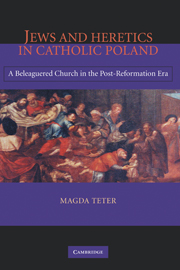Book contents
- Frontmatter
- Contents
- List of Illustrations
- Preface and Acknowledgments
- Note on Terms, Spelling, and Translations
- Abbreviations
- JEWS AND HERETICS IN CATHOLIC POLAND
- Introduction
- 1 “One Mystical Body … Only One Shepherd”: The Church Ideals of Social Order
- 2 The Upset Social Order: Nobles and the Jews in Poland
- 3 Heresy and the Fleeting “Triumph of the Counter-Reformation”
- 4 “Bad and Cruel Catholics”: Christian Sins and Social Intimacies Between Jews and Christians
- 5 “A Shameful Offence”: The Nobles and Their Jews
- 6 “Countless Books Against Common Faith”: Catholic Insularity and Anti-Jewish Polemic
- 7 “Warding Off Heretical Depravity”: “Whom Does the Catholic Church Reject, Condemn and Curse?”
- Conclusion: Did the Counter-Reformation Triumph in Poland?
- Glossary
- Notes
- Selected Bibliography
- Index
1 - “One Mystical Body … Only One Shepherd”: The Church Ideals of Social Order
Published online by Cambridge University Press: 12 January 2010
- Frontmatter
- Contents
- List of Illustrations
- Preface and Acknowledgments
- Note on Terms, Spelling, and Translations
- Abbreviations
- JEWS AND HERETICS IN CATHOLIC POLAND
- Introduction
- 1 “One Mystical Body … Only One Shepherd”: The Church Ideals of Social Order
- 2 The Upset Social Order: Nobles and the Jews in Poland
- 3 Heresy and the Fleeting “Triumph of the Counter-Reformation”
- 4 “Bad and Cruel Catholics”: Christian Sins and Social Intimacies Between Jews and Christians
- 5 “A Shameful Offence”: The Nobles and Their Jews
- 6 “Countless Books Against Common Faith”: Catholic Insularity and Anti-Jewish Polemic
- 7 “Warding Off Heretical Depravity”: “Whom Does the Catholic Church Reject, Condemn and Curse?”
- Conclusion: Did the Counter-Reformation Triumph in Poland?
- Glossary
- Notes
- Selected Bibliography
- Index
Summary
In 1302, pope boniface viii wrote in his bull unam sanctam, “we declare, we proclaim, we define that it is absolutely necessary for salvation that every human creature be subject to the Roman Pontiff.” The bull was a culmination of a theory of hierarchy of power developed over several centuries by Church jurists and theologians. That theory established an ideal of a society, a respublica Christiana, a broader Christian ecclesia. In its highest form that society was to be entirely Christian, functioning according to Christian laws and dogmas. It was to be, in the words of Pope Boniface VIII, “one sole mystical body whose Head is Christ and the head of Christ is God, and his vicar Peter and Peter's successor.” The pope claimed the supremacy of spiritual power and a hierarchy of power in the world: “For with truth as our witness, it belongs to spiritual power to establish the terrestrial power and to pass judgment if it has not been good. Thus is accomplished the prophecy of Jeremiah concerning the Church and the ecclesiastical power: ‘Behold to-day I have placed you over nations, and over kingdoms and the rest…. Therefore whoever resists this power thus ordained by God, resists the ordinance of God’ [Rom 13:2].”
“TWO SWORDS … THE SPIRITUAL AND THE TEMPORAL”
Pope Boniface VIII justified the claim of papal supreme authority in his Unam Sanctam by citing a medieval interpretation of an ambiguous verse in Luke 22:38, “Behold, here are two swords.
- Type
- Chapter
- Information
- Jews and Heretics in Catholic PolandA Beleaguered Church in the Post-Reformation Era, pp. 7 - 20Publisher: Cambridge University PressPrint publication year: 2005



